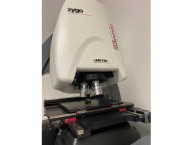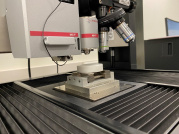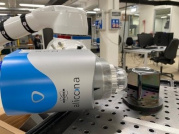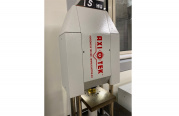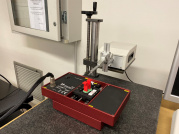Technological Surface Characterisation
Technological surface characterisation allows to qualifying components and manufacturing processes to achieve their optimisation and an increase of their quality. Surface characterisation is performed both from the geometrical (topographical) and mechanical stand point. In fact, those two sets of properties are intertwined because shape and texture affects physical, optical, mechanical and tribological properties of materials. Furthermore, the study of technological signatures of manufacturing processes, being these also dependent on topography and mechanical properties, enables for deeper knowledge of the process and eventually for control and optimisation. Thus, it has a significant role in developing new additive manufacturing processes.
This research area exploits a metrological laboratory with state of the art equipment. Topographical characterisation relies upon coherence scanning interferometer with sub-nanometre resolution and on optical metallographic microscopes. Mechanical characterisation is performed by means of conventional hardness test (Rockwell and Brinell) and unconventional such as instrumented indentation test (IIT) and Electrical contact resistance (ECR) testing, which allows for non-destructive evaluation of material hardness, elastic modulus, creep, relaxation and viscoelastic properties. Mechanical tests are performed on both nano- and macro-scale to characterise local grains and bulk average properties.
Research activity is carried out with care about the metrological properties of characterisation techniques and it additionally aims at improving characterisation uncertainties, pipelines and standards.
Facilities for technological surface characterisation:
- Topographical Characterisation
- Topographical microscope: Interferometer CSI Zygo NewView 9000
- Topographical microscope: Focus Variation Infinite Focus R25 (sensor for cobot and robot arm)
- Contact stylus profilometer RTP80 Labormet
- Mechanical characterisation
- Nanoindentation and micro scratch tester STeP6 (NHT3 and MCT3) by Anton Paar
- Macro instrumented indentation tester: ISRHU09 by AXIOTEK
The facilities are hosted in a state-of-the-art metrological room of Mind4Lab funded by “Ministero dell’Istruzione, dell’Università e della Ricerca”. Award “TESUN-83486178370409 finanziamento dipartimenti di eccellenza CAP. 1694 TIT. 232 ART. 6”. The metrological room is temperature controlled (20±1) °C, and hosts additional facilities for geometrical characterisation:
a) CMM IOTA 101
b) CMM Global Image
c) Structured light projection system: GOM Atos ScanBox 4


